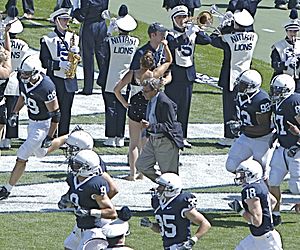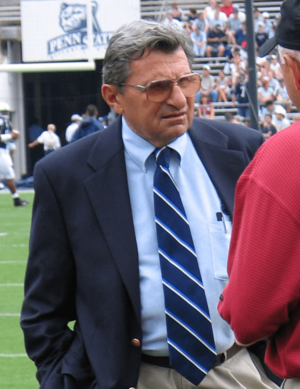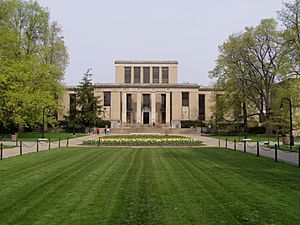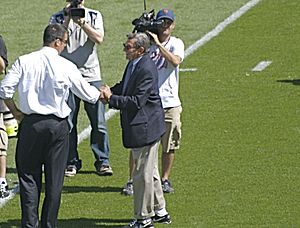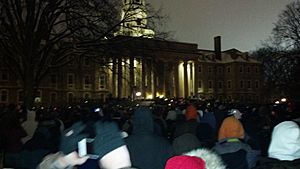Joe Paterno facts for kids
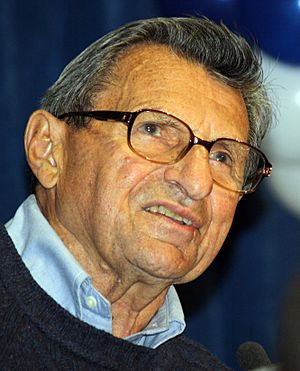
Paterno at a 2010 rally
|
|
| Biographical details | |
|---|---|
| Born | December 21, 1926 Brooklyn, New York, U.S. |
| Died | January 22, 2012 (aged 85) State College, Pennsylvania, U.S. |
| Playing career | |
| 1946–1949 | Brown |
| Position(s) | Quarterback, cornerback |
| Coaching career (HC unless noted) | |
| 1950–1965 | Penn State (assistant) |
| 1966–2011 | Penn State |
| Administrative career (AD unless noted) | |
| 1980–1982 | Penn State |
| Head coaching record | |
| Overall | 409–136–3 |
| Bowls | 24–12–1 |
| Accomplishments and honors | |
| Championships | |
| 2 National (1982, 1986) 3 Big Ten (1994, 2005, 2009) |
|
| Awards | |
| Sports Illustrated Sportsman of the Year (1986) 5× AFCA COY (1968, 1978, 1982, 1986, 2005) 3× Walter Camp COY (1972, 1994, 2005) 3× Eddie Robinson COY (1978, 1982, 1986) 2× Bobby Dodd COY (1981, 2005) Paul "Bear" Bryant Award (1986) 3× George Munger Award (1990, 1994, 2005) Amos Alonzo Stagg Award (2002) Home Depot Coach of the Year Award (2005) Sporting News College Football COY (2005) 3× Big Ten Coach of the Year (1994, 2005, 2008) |
|
| College Football Hall of Fame Inducted in 2007 (profile) |
|
Joseph Vincent Paterno (born December 21, 1926 – died January 22, 2012), often called JoePa, was a famous American college football player and coach. He was the main coach for the Penn State Nittany Lions football team from 1966 to 2011.
Paterno holds the record for the most wins by a coach in the top college football division, with 409 victories. His amazing career ended on November 9, 2011, when he was removed from his coaching role. He passed away 74 days later from complications related to lung cancer.
Joe Paterno was born in Brooklyn, New York. He went to Brown University, where he played football as both a quarterback and a cornerback. After college, he decided to become a football coach instead of going to law school. In 1950, he became an assistant coach at Penn State. His college coach, Rip Engle, convinced him to join the team.
In 1966, Paterno became the head coach at Penn State. He quickly led the team to two perfect seasons in 1968 and 1969, meaning they didn't lose any games. His teams won two national championships in 1982 and 1986. He coached five undefeated teams that won major bowl games. In 2007, he was honored by being added to the College Football Hall of Fame. During his time as coach, he led the Nittany Lions to 37 bowl games, winning 24 of them. He even turned down offers to coach professional NFL teams like the Pittsburgh Steelers and the New England Patriots.
Contents
Early Life and College Years
Joseph Vincent Paterno was born on December 21, 1926, in Brooklyn, New York. His mother, Florence de LaSalle Cafiero, was a homemaker, and his father, Angelo Lafayette Paterno, worked as a law clerk. His family had Italian roots. Throughout his life, he kept a strong Brooklyn accent.
In 1944, Paterno finished high school at Brooklyn Preparatory School. Six weeks later, he joined the Army during World War II. He served for a year and was discharged in time to start college in 1946. He attended Brown University, where his tuition was paid by a generous person named Busy Arnold.
At Brown, Paterno was part of the Delta Kappa Epsilon fraternity, which is a social club for college students. He played both quarterback and cornerback for the Bears football team. He still shares the school record for the most interceptions, with 14. Paterno studied English literature and graduated in 1950.
Coaching Career Highlights
Paterno had been accepted to law school but chose to coach at Penn State instead. He joined Rip Engle as an assistant coach in 1950. Engle had been his coach at Brown University. In 1964, Paterno became the top assistant coach. When Engle retired in 1966, Paterno was named his replacement the very next day.
One of Paterno's players, John Cappelletti, won the Heisman Trophy in 1973. This award goes to the most outstanding player in college football.
In 1995, Paterno publicly apologized for getting very upset with the coach of the Rutgers team after a game.
From 2000 to 2004, the Penn State football team had some tough years. Some fans and media wondered if Paterno, who was getting older, should retire. But Paterno said he would stay until his contract ended in 2008. During his time as coach, Beaver Stadium, where Penn State plays, grew much larger. It expanded six times, from holding 46,284 fans in 1966 to 106,572 in 2001.
In 2005, Paterno said he would think about retiring if the team didn't do well that year. But the 2005 team had a fantastic season, winning 11 games and only losing one. They became champions of the Big Ten Conference and won the 2006 Orange Bowl.
The 2009 season was Paterno's 44th year as head coach at Penn State. This made him the coach with the most years at one university in Division I football. His 2011 season was his 62nd year on the Penn State coaching staff, which is another record for a football coach at a single university.
Paterno's salary was revealed in 2007 to be over $500,000. He said he was "paid well" and had "all the money I need." He was known for his unique game-day look: thick glasses, rolled-up dress pants (to save on cleaning), and white socks.
Bowl Game Success and Championships
Joe Paterno holds the NCAA record for the most bowl game appearances, with 37. He also has 24 bowl victories, which is an official NCAA record. His bowl game record was 24 wins, 12 losses, and 1 tie. He was the first coach to win each of the four major bowl games: the Rose, Orange, Fiesta, and Sugar Bowls, plus the Cotton Bowl Classic. Penn State won at least three bowl games in every decade Paterno coached.
Paterno led Penn State to two national championships in 1982 and 1986. He also coached five undefeated teams that didn't tie any games (1968, 1969, 1973, 1986, and 1994). Four of these unbeaten teams won major bowl games but were not named national champions.
Under Paterno, Penn State won many famous bowl games. These included the Orange Bowl (four times), Cotton Bowl (twice), Fiesta Bowl (six times), Sugar Bowl (once), Rose Bowl (once), and Outback Bowl (three times).
After Penn State joined the Big Ten Conference in 1993, Paterno's teams won the Big Ten championship three times (1994, 2005, and 2008). His teams finished in the Top 10 national rankings 29 times.
Awards and Special Honors
Joe Paterno received many awards and honors throughout his career:
- Sports Illustrated Sportsman of the Year in 1986.
- AFCA Coach of the Year five times (1968, 1978, 1982, 1986, 2005).
- Walter Camp Coach of the Year Award three times (1972, 1994, 2005).
- Eddie Robinson Coach of the Year three times (1978, 1982, 1986).
- Bobby Dodd Coach of the Year Award twice (1981, 2005).
- Paul "Bear" Bryant Award in 1986.
- George Munger Award three times (1990, 1994, 2005).
- Amos Alonzo Stagg Award in 2002.
- The Home Depot Coach of the Year Award in 2005.
- Sporting News College Football Coach of the Year in 2005.
- Dave McClain Big Ten Conference Coach of the Year three times (1994, 2005, 2008).
- NCAA Gerald R. Ford Award in 2011 (later taken back by the NCAA).
In 2006, Paterno was chosen for the College Football Hall of Fame. The rules were changed so coaches over 75 could be eligible without waiting until retirement. He was officially inducted on December 4, 2007, and celebrated in a ceremony on July 19, 2008.
In 2009, Sporting News named Paterno 13th on their list of the 50 greatest coaches of all time across many sports.
In 2010, the Maxwell Football Club created the Joseph V. Paterno Award. It was given to college football coaches who made a positive impact on their university, players, and community. This award was later stopped. Also in 2010, the Big Ten Conference named their football championship trophy the Stagg - Paterno Championship Trophy. However, in November 2011, the name was changed to the Stagg Championship Trophy.
Paterno's Ideas on College Football
Paterno always supported the idea of a college football playoff system. He was often asked about it because only one of his five undefeated teams was voted national champion. A college football playoff system finally started three years after he left coaching.
Paterno also believed that college athletes who receive scholarships should get a small amount of spending money. He thought this was fair because many scholarship athletes came from families with little money. Also, their busy practice schedules made it hard for them to get part-time jobs like other students.
At first, Paterno preferred not to play "true freshmen" (first-year students). But later, he did play them to keep his team competitive. Some Penn State recruits would even finish high school early to start college in the spring. This allowed them to join spring football practices.
In 2010, Paterno and former NFL coach Mike Ditka suggested that removing face masks from helmets might reduce concussions and other injuries in football.
Penn State's football players were recognized twice for their excellent academic performance. The team was ranked number one among top BCS teams in 2009 and 2011. This ranking looked at how many players graduated compared to other students. It also checked if there was a difference in graduation rates between African-American players and other players or students.
Fair Play and Instant Replay
In 2002, Paterno, at 76 years old, famously chased a referee after a close loss to Iowa. He believed a Penn State player had caught a pass for a first down, but the referee ruled it incomplete. Replays on the stadium screen showed Paterno was right.
Just weeks later, in another game against Michigan, a similar play happened. A Penn State receiver made a catch that would have set up a game-winning field goal. But the play was ruled out of bounds, even though replays clearly showed the player was in bounds.
These incidents, along with Paterno's public complaints, helped lead to a big change in college football. In 2004, the Big Ten Conference became the first college football conference to use instant replay. This meant referees could review plays using video. Within a year, almost all other major college football conferences adopted a similar system.
Life Beyond Football
Giving Back and Education
After becoming head coach in 1966, Paterno started what he called a "Grand Experiment." He wanted to show that athletes could be successful both in sports and in school. Because of his efforts, Penn State's football players have consistently done very well academically compared to other top college teams.
For example, the NCAA's 2008 report showed that 78% of Penn State's football players graduated within four years. This was much higher than the average of 67% for Division I schools. In 2011, Penn State football players had an 80% graduation rate. There was also no difference in graduation rates between black and white players, which is very rare for college football teams.
Paterno and his wife, Sue, also gave a lot of money to support academics at Penn State. They donated over $4 million to various university departments and colleges. They helped fund the Penn State All-Sports Museum and the Pasquerilla Spiritual Center. After helping raise over $13.5 million for the 1997 expansion of the Pattee Library, the university named the new part the Paterno Library in their honor.
In 2007, former player Franco Harris honored Paterno by putting his story and picture on boxes of Super Donuts and Super Buns. A part of the sales went to a fund for the university library named after Paterno.
Paterno also attended the annual Penn State Dance Marathon, known as THON. This is a huge student-run charity event that raises money for children with cancer. In 2012, it raised over $10 million.
Political Interests
Paterno was a conservative in politics and a personal friend of former President George H. W. Bush. He helped Bush's campaign in 1988 and spoke at the Republican National Convention. He was also a close friend of President Gerald R. Ford and introduced President George W. Bush at a rally in 2004.
In 1974, some leaders in the Pennsylvania Republican Party even thought about Paterno running for lieutenant governor.
His son, Scott Paterno, ran for Congress in 2004 but lost. Joe Paterno once said in 2008, "I brought my kids up to think for themselves since day one." He mentioned that he was a Republican, but his son Jay supported Barack Obama, and his daughter supported Hillary Clinton.
Personal Life
Joe Paterno met his wife, Suzanne Pohland, when he was an assistant coach and she was a freshman at the campus library. She was 13 years younger than him and an excellent English literature student. They got married in 1962, the year she graduated.
They had five children: Diana, Joseph Jr. "Jay", Mary Kay, David, and Scott. All their children graduated from Penn State. Jay Paterno even became the quarterbacks coach at Penn State for a time. The Paternos had 17 grandchildren.
Paterno and his wife spent their summers in Avalon, New Jersey. They also wrote a children's book together called We Are Penn State!, which is about a typical Penn State homecoming weekend.
Health Challenges and Passing
In November 2006, Paterno was involved in a collision on the sideline during a game against Wisconsin. He was hit in the knee by a player's helmet. Paterno, who was 79 at the time, broke a bone in his shin and damaged knee ligaments. He coached the 2007 Outback Bowl from the press box while recovering.
In November 2008, Paterno had successful hip replacement surgery. He had sprained his leg trying to show players how to do "onside kicks" during practice. While recovering, he coached the rest of that season and the 2009 Rose Bowl from the press box. After these injuries, he started using a golf cart to move around the field during practices.
Paterno was injured again in August 2011 when he collided with a player during practice. He suffered small fractures to his hip and shoulder. He didn't need surgery, but he started the 2011 season in a wheelchair.
On November 18, 2011, just nine days after leaving his coaching job, Paterno's son Scott announced that his father had a treatable form of lung cancer. On January 13, 2012, Paterno was hospitalized for problems related to his cancer treatment. He remained in the hospital until he passed away nine days later, on January 22, 2012. His death came 74 days after he left Penn State.
Many important leaders in the U.S. shared their sadness and respect for Paterno. Former President George H. W. Bush called him "an outstanding American." Pennsylvania Governor Tom Corbett said Paterno's legacy as the winningest coach and his generosity would "stand as monuments to his life." On January 23, Governor Corbett ordered all state flags to be lowered to half staff in Paterno's honor.
Paterno's funeral was held in State College on January 25, 2012. About 750 people attended the private ceremony. Thousands of people then lined the streets for his funeral procession. Paterno was buried in Spring Creek Presbyterian Cemetery. About 12,000 people attended a public memorial service held at the Bryce Jordan Center on January 26, 2012.
Coaching Record
When he passed away, Joe Paterno had a coaching record of 409 wins, 136 losses, and 3 ties. This made him the coach with the most wins in the top division of NCAA football history.
| Year | Team | Overall | Conference | Standing | Bowl/playoffs | Coaches# | AP° | ||
|---|---|---|---|---|---|---|---|---|---|
| Penn State Nittany Lions (NCAA University Division / Division I / Division I-A independent) (1966–1992) | |||||||||
| 1966 | Penn State | 5–5 | |||||||
| 1967 | Penn State | 8–2–1 | T Gator | 11 | 10 | ||||
| 1968 | Penn State | 11–0 | W Orange | 3 | 2 | ||||
| 1969 | Penn State | 11–0 | W Orange | 2 | 2 | ||||
| 1970 | Penn State | 7–3 | 19 | 18 | |||||
| 1971 | Penn State | 11–1 | W Cotton | 11 | 5 | ||||
| 1972 | Penn State | 10–2 | L Sugar | 8 | 10 | ||||
| 1973 | Penn State | 12–0 | W Orange | 5 | 5 | ||||
| 1974 | Penn State | 10–2 | W Cotton | 7 | 7 | ||||
| 1975 | Penn State | 9–3 | L Sugar | 10 | 10 | ||||
| 1976 | Penn State | 7–5 | L Gator | ||||||
| 1977 | Penn State | 11–1 | W Fiesta | 4 | 5 | ||||
| 1978 | Penn State | 11–1 | L Sugar | 4 | 4 | ||||
| 1979 | Penn State | 8–4 | W Liberty | 18 | 20 | ||||
| 1980 | Penn State | 10–2 | W Fiesta | 8 | 8 | ||||
| 1981 | Penn State | 10–2 | W Fiesta | 3 | 3 | ||||
| 1982 | Penn State | 11–1 | W Sugar | 1 | 1 | ||||
| 1983 | Penn State | 8–4–1 | W Aloha | 17 | |||||
| 1984 | Penn State | 6–5 | |||||||
| 1985 | Penn State | 11–1 | L Orange | 3 | 3 | ||||
| 1986 | Penn State | 12–0 | W Fiesta | 1 | 1 | ||||
| 1987 | Penn State | 8–4 | L Florida Citrus | ||||||
| 1988 | Penn State | 5–6 | |||||||
| 1989 | Penn State | 8–3–1 | W Holiday | 14 | 15 | ||||
| 1990 | Penn State | 9–3 | L Blockbuster | 10 | 11 | ||||
| 1991 | Penn State | 11–2 | W Fiesta | 3 | 3 | ||||
| 1992 | Penn State | 7–5 | L Blockbuster† | 24 | |||||
| Penn State Nittany Lions (Big Ten Conference) (1993–2011) | |||||||||
| 1993 | Penn State | 10–2 | 6–2 | 3rd | W Florida Citrus | 7 | 8 | ||
| 1994 | Penn State | 12–0 | 8–0 | 1st | W Rose | 2 | 2 | ||
| 1995 | Penn State | 9–3 | 5–3 | T–3rd | W Outback | 12 | 13 | ||
| 1996 | Penn State | 11–2 | 6–2 | T–3rd | W Fiesta† | 7 | 7 | ||
| 1997 | Penn State | 9–3 | 6–2 | T–2nd | L Florida Citrus | 17 | 16 | ||
| 1998 | Penn State | 9–3 | 5–3 | 5th | W Outback | 15 | 17 | ||
| 1999 | Penn State | 10–3 | 5–3 | T–4th | W Alamo | 11 | 11 | ||
| 2000 | Penn State | 5–7 | 4–4 | T–6th | |||||
| 2001 | Penn State | 5–6 | 4–4 | T–4th | |||||
| 2002 | Penn State | 9–4 | 5–3 | 4th | L Capital One | 15 | 16 | ||
| 2003 | Penn State | 3–9 | 1–7 | T–8th | |||||
| 2004 | Penn State | 4–7 | 2–6 | 9th | |||||
| 2005 | Penn State | 11–1 | 7–1 | T–1st | W Orange† | 3 | 3 | ||
| 2006 | Penn State | 9–4 | 5–3 | T–4th | W Outback | 25 | 24 | ||
| 2007 | Penn State | 9–4 | 4–4 | T–5th | W Alamo | 25 | |||
| 2008 | Penn State | 11–2 | 7–1 | T–1st | L Rose† | 8 | 8 | ||
| 2009 | Penn State | 11–2 | 6–2 | T–2nd | W Capital One | 8 | 9 | ||
| 2010 | Penn State | 7–6 | 4–4 | T–4th | L Outback | ||||
| 2011 | Penn State | 8–1 | 5–0 | (Leaders) | 12 | 12 | |||
| Penn State: | 409–136–3 | 95–54 | |||||||
| Total: | 409–136–3 | ||||||||
| National championship Conference title Conference division title or championship game berth | |||||||||
|
|||||||||
Coaching Family Tree
Many assistant coaches and players who worked under Joe Paterno went on to become head coaches in the NFL or at other colleges. This shows how much of an impact he had on the sport.
Here are some of the coaches who worked under Paterno and later became head coaches:
- Joe McMullen: San Jose State (1969-1970)
- George Welsh: Navy (1973-1981), Virginia (1982-2000)
- Jim Weaver: Villanova (1974, acting)
- George Landis: Bloomsburg Huskies football (1982-1985), Bucknell (1986-1988)
- Dick Anderson: Rutgers (1984-1989)
- John Rosenberg: Brown (1984-1989)
- Bob Tucker: Wooster (1985-1994)
- Rip Scherer: James Madison (1991-1994), Memphis (1995-2000)
- Bill Bowes: New Hampshire (1992-1998)
- Jim Caldwell: Wake Forest (1993-2000), Indianapolis Colts (2009-2011), Detroit Lions (2014-2017)
- Greg Gattuso: Duquesne (1993–2004), Albany (2014–present)
- Ron Dickerson: Temple (1993-1997), Alabama State (1998-1999), Lambuth (2010)
- Craig Cirbus: Buffalo (1995-2000)
- Paul Shaffner: Glenville State (2000-2003), Buffalo State (2004-2008)
- Greg Schiano: Rutgers (2001–2011, 2020–present), Tampa Bay Buccaneers (2012–2013)
- Dave Opfar: Sain Francis (2002-2009)
- Al Golden: Temple (2006-2010), Miami (2011-2015)
- Frank Spaziani: Boston College Eagles (2009-2012)
- Darryl Bullock: North Carolina Central (2010, interim)
- Tom Bradley: Penn State (2011, interim)
- Jamie Barresi: Ottawa (2013-2019)
- Kenny Carter: Delaware State (2015-2017)
- Earnest Wilson: Savannah State (2013-2015), Elizabeth City (2015-2016)
- Matt Rhule: Temple (2013–2016), Baylor (2017–2019), Carolina Panthers (2020–2022), Nebraska (2023–present)
- Larry Johnson: Ohio State (2021, acting)
- Paul Alexander: Dresden Monarchs (2023)
Here are some of the players who played under Paterno and later became head coaches:
- Al Golden: Temple (2006-2010), Miami (2011-2015)
- Mike Munchak: Tennessee Titans (2011-2013)
- Paul Pasqualoni: Connecticut (2011-2013)
- Matt Rhule: Temple (2013–2016), Baylor (2017–2019), Carolina Panthers (2020–2022), Nebraska (2023–present)
One player under Paterno became a general manager or executive in the NFL:
- Matt Millen: Detroit Lions (2001-2008)
See also
 In Spanish: Joe Paterno para niños
In Spanish: Joe Paterno para niños
- List of college football coaches with 200 wins
- List of college football coaches with 30 seasons
- List of College Football Hall of Fame inductees (coaches)
 | Madam C. J. Walker |
 | Janet Emerson Bashen |
 | Annie Turnbo Malone |
 | Maggie L. Walker |


